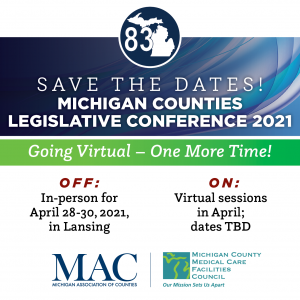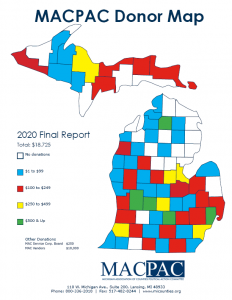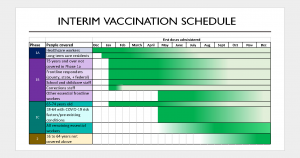Broadband equipment property tax exemption passes the Senate
SB 46, sponsored by Sen. Aric Nesbitt (R-Van Buren) is a bill that will exempt eligible high speed broadband equipment installed after December 31, 2020 from property taxes if that equipment resolves a lack of broadband service and can deliver at least 25 megabits per second (Mbps) downstream and three Mbps upstream for internet service. The bill passed the Senate this week on a party line vote. MAC remains committed to finding solutions that will expand broadband to unserved and underserved areas, but oppose legislation that exempts property from property taxes without full reimbursement of those funds from the State. We all recognize Michigan’s digital data infrastructure is not adequate for the needs of all residents. The question is: How do we resolves the access issue, so every resident can have the opportunity to prosper regardless of their geographical location? MAC disagrees with the assumption that a broad-based property tax exemption is the solution to the problem. The simple economics are that the providers are not building in rural areas because there are not enough customers to ensure a decent rate of return on the investment. The biggest hurdle to overcome is the cost of installation and the return on investment. Exempting property for the specific business classes may provide encouragement to investment, but it significantly strains the ability of local units of government to provide the services their residents need and deserve.
For more information on this issue, please contact Deena Bosworth at bosworth@micounties.org
 MDHHS director discusses vaccine progress with Podcast 83
MDHHS director discusses vaccine progress with Podcast 83
 Staff picks
Staff picks
- Evidence-based government gets a boost during COVID (Governing)
- U.S. Department of the Interior revokes counties’ veto power over Land and Water Conservation Fund federal land acquisitions (NACo)
- California might make virtual meetings a permanent option (Governing)
- Energy policy affects Michigan’s health (Citizens Research Council)

 Gov. Gretchen Whitmer’s fiscal 2022 budget proposal makes important and much needed boosts to local governments dealing with the COVID-19 crisis and to public infrastructure, said MAC’s executive director on Thursday.
Gov. Gretchen Whitmer’s fiscal 2022 budget proposal makes important and much needed boosts to local governments dealing with the COVID-19 crisis and to public infrastructure, said MAC’s executive director on Thursday.
 The Michigan Association of Counties and Michigan Association of County Clerks
The Michigan Association of Counties and Michigan Association of County Clerks  Elizabeth Hertel, recently named by Gov. Gretchen Whitmer to lead the state’s mammoth Department of Health and Human Services, will be the guest on a special live episode of Podcast 83 on Tuesday, Feb. 16 at 4:30 p.m.
Elizabeth Hertel, recently named by Gov. Gretchen Whitmer to lead the state’s mammoth Department of Health and Human Services, will be the guest on a special live episode of Podcast 83 on Tuesday, Feb. 16 at 4:30 p.m. While
While  A bill to give tax breaks to firms installing new broadband equipment in Michigan cleared the Senate Committee on Energy and Technology this week, despite ongoing MAC opposition.
A bill to give tax breaks to firms installing new broadband equipment in Michigan cleared the Senate Committee on Energy and Technology this week, despite ongoing MAC opposition. Webinar focuses on board member conduct
Webinar focuses on board member conduct The Michigan Department of Treasury and MSU Extension are excited to announce our next Fiscally Ready Communities training webinar titled, “Financial Best Practices.” This 90-minute webinar will take place at 10 a.m. on Thursday, March 25, 2021.
The Michigan Department of Treasury and MSU Extension are excited to announce our next Fiscally Ready Communities training webinar titled, “Financial Best Practices.” This 90-minute webinar will take place at 10 a.m. on Thursday, March 25, 2021. The House passed their $3.5B COVID relief funding plan on a largely party-line vote.
The House passed their $3.5B COVID relief funding plan on a largely party-line vote.  2021 Legislative Conference will be virtual in April
2021 Legislative Conference will be virtual in April The crisis in funding for Michigan’s local governments continues, MAC’s Deena Bosworth told the House Committee on Local Government and Municipal Finance
The crisis in funding for Michigan’s local governments continues, MAC’s Deena Bosworth told the House Committee on Local Government and Municipal Finance  FEMA now can pay 100 percent federal funding for the costs of activities that have previously been determined eligible, from the beginning of the pandemic in January 2020 to Sept. 30, 2021, under a
FEMA now can pay 100 percent federal funding for the costs of activities that have previously been determined eligible, from the beginning of the pandemic in January 2020 to Sept. 30, 2021, under a  A bill that would give a 10-year personal property tax (PPT) exemption to businesses that provide broadband service of at least 10 megabits per second downstream received a hearing this week before the Senate Committee on Energy and Technology.
A bill that would give a 10-year personal property tax (PPT) exemption to businesses that provide broadband service of at least 10 megabits per second downstream received a hearing this week before the Senate Committee on Energy and Technology. A MAC-supported bill to clarify state law so it reflects how the state and counties are handling veteran service funds was filed this week in the House.
A MAC-supported bill to clarify state law so it reflects how the state and counties are handling veteran service funds was filed this week in the House. MACPAC exceeds $18,000 in 2020 fundraising
MACPAC exceeds $18,000 in 2020 fundraising The Michigan Association of Counties
The Michigan Association of Counties  In preparation for the 2021 dig season, MISS DIG 811 will be hosting regional virtual pre-construction meetings between Feb. 22 and March 1. See lists below for your county’s region.
In preparation for the 2021 dig season, MISS DIG 811 will be hosting regional virtual pre-construction meetings between Feb. 22 and March 1. See lists below for your county’s region. Gov. Gretchen Whitmer and Republicans who control the Michigan House of Representatives have a $2 billion difference of opinion on what to do next, spending wise, to address the COVID-19 pandemic.
Gov. Gretchen Whitmer and Republicans who control the Michigan House of Representatives have a $2 billion difference of opinion on what to do next, spending wise, to address the COVID-19 pandemic. Gov. Gretchen Whitmer’s inclusion of
Gov. Gretchen Whitmer’s inclusion of  MAC Executive Director Stephan Currie was appointed this week by Gov. Gretchen Whitmer to serve on her Protect Michigan Commission and attended the body’s first meeting on Friday, when members were presented with updated information on Michigan’s
MAC Executive Director Stephan Currie was appointed this week by Gov. Gretchen Whitmer to serve on her Protect Michigan Commission and attended the body’s first meeting on Friday, when members were presented with updated information on Michigan’s  Local governments need money, Senate committee told
Local governments need money, Senate committee told It’s still January, but the first deadline for indigent defense plans in 2021 is not that far away. The first round of submissions for plans to the Michigan Indigent Defense Commission (MIDC), which are to include standard 5, are due by April 27. This year, MIDC also will be adopting a commonly used state grant program, EGRAMs. Training for EGRAMS will be available March 22-29.
It’s still January, but the first deadline for indigent defense plans in 2021 is not that far away. The first round of submissions for plans to the Michigan Indigent Defense Commission (MIDC), which are to include standard 5, are due by April 27. This year, MIDC also will be adopting a commonly used state grant program, EGRAMs. Training for EGRAMS will be available March 22-29. The Michigan Department of Resources (DNR) has released its
The Michigan Department of Resources (DNR) has released its  MAC partner gives advice on maximizing your internet
MAC partner gives advice on maximizing your internet February jails call to focus on rapid opioid screener tool
February jails call to focus on rapid opioid screener tool A state law authorizing four-year terms for county commissioners tops the
A state law authorizing four-year terms for county commissioners tops the  The Michigan Department of Health and Human Services (MDHHS) released its next epidemic order which will go into effect on Monday, Feb. 1 and will last three weeks, until Sunday, Feb. 21, which includes provisions for indoor dining.
The Michigan Department of Health and Human Services (MDHHS) released its next epidemic order which will go into effect on Monday, Feb. 1 and will last three weeks, until Sunday, Feb. 21, which includes provisions for indoor dining. MAC’s six policy committees will have members from at least 44 of Michigan’s 83 counties after MAC Board President Veronica Klinefelt of Macomb County approved appointments for 2021 this week.
MAC’s six policy committees will have members from at least 44 of Michigan’s 83 counties after MAC Board President Veronica Klinefelt of Macomb County approved appointments for 2021 this week.  Legislative committees were announced this week by the 101st Legislature.
Legislative committees were announced this week by the 101st Legislature. At a press conference held Tuesday afternoon, Gov. Gretchen Whitmer unveiled a
At a press conference held Tuesday afternoon, Gov. Gretchen Whitmer unveiled a  Registration is now open for the
Registration is now open for the 




